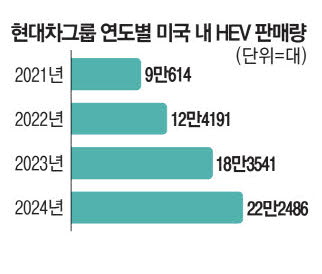
Hyundai Motor Group announced on the 10th that the cumulative sales of HEVs in the U.S. recorded 1 million units until February, surpassing 1 million units in 14 years after launching the Sonata HEV model in the U.S. market for the first time in 2011. By brand, Hyundai Motor sold 575,175 units and Kia sold 433,731 units.
Hyundai Motor and Kia have continuously expanded their HEV models since launching the Sonata HEV and K5 HEV in 2011. As a result, it has continued to grow rapidly every year, starting with sales of 13,491 units in 2011, exceeding 50,000 units for the first time in 2017, and recording 96,614 units in 2021, when HEV models of popular sports utility vehicles (SUVs) such as Tucson, Santa Fe, and Sorento were introduced, with 124,191 units in 2022, 183,541 units in 2023, and 222,486 units in 2024. This year, HEV's popularity has not declined, with 35,317 units sold for two months in January and February.
Hyundai Motor Group expects HEV sales in the U.S. to continue to grow. "The Kia Carnival HEV model, which began selling in September last year, became very popular right after its launch, selling 11,107 units in about six months, with an average of 1,800 units sold per month," a Hyundai Motor official said. "We expect HEV sales to expand further as Hyundai's flagship SUV Palisade HEV model will also be released in the U.S. as early as the third quarter."
Hyundai Motor Group plans to produce HEV models at its new plant in Georgia and Hyundai Motor Group's Metaplant America, which will be in full operation in the first half of this year. The strategy is to partially replace HEVs exported from Korea with production in the United States. In addition, production of HEV models can be increased as needed at Hyundai Motor's Alabama plant and Kia Georgia plant.
[Kim Dongeun is a reporter]














